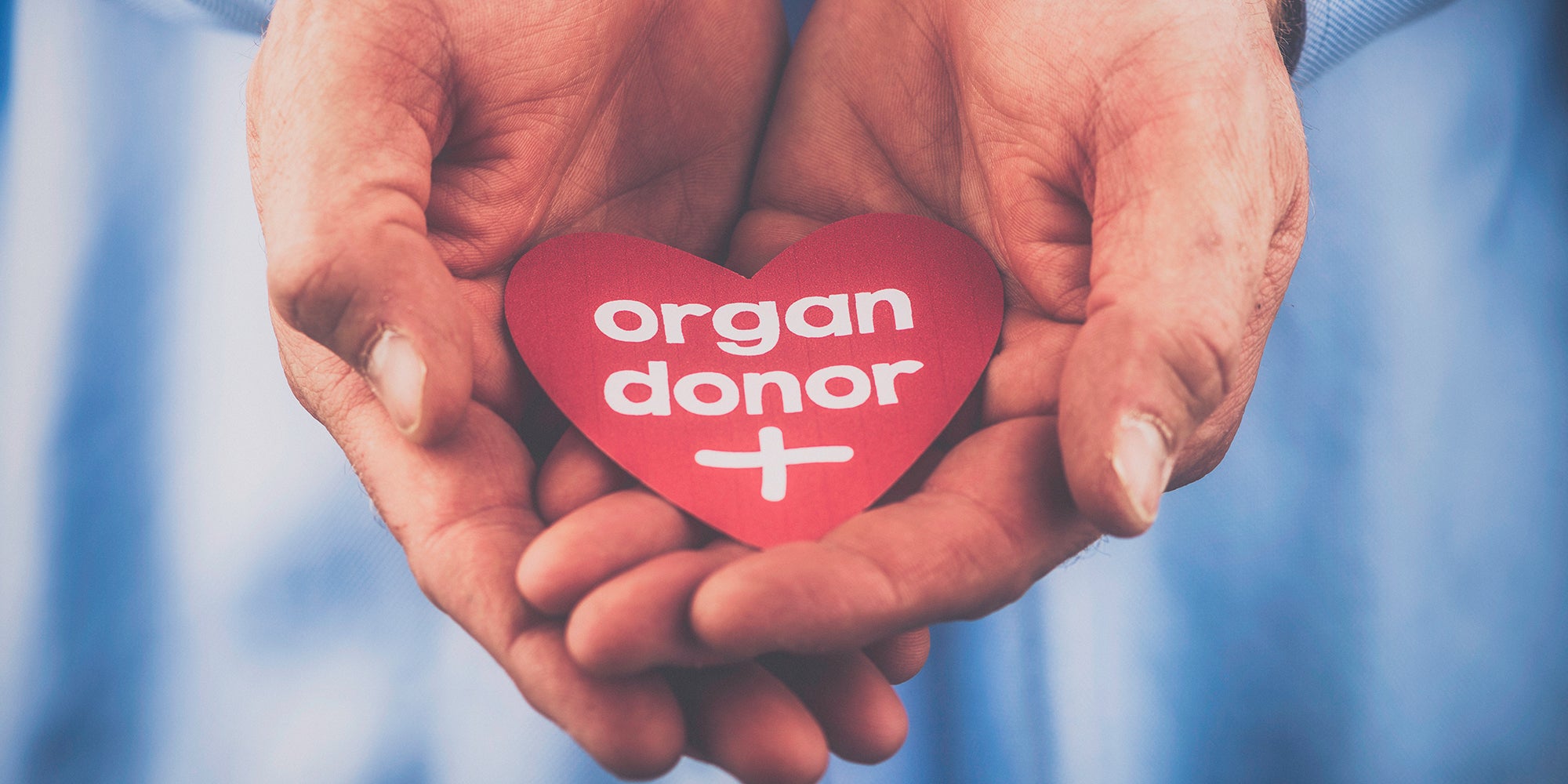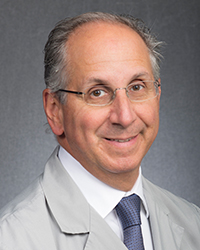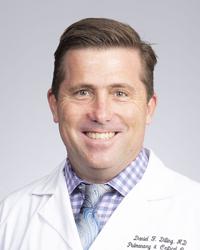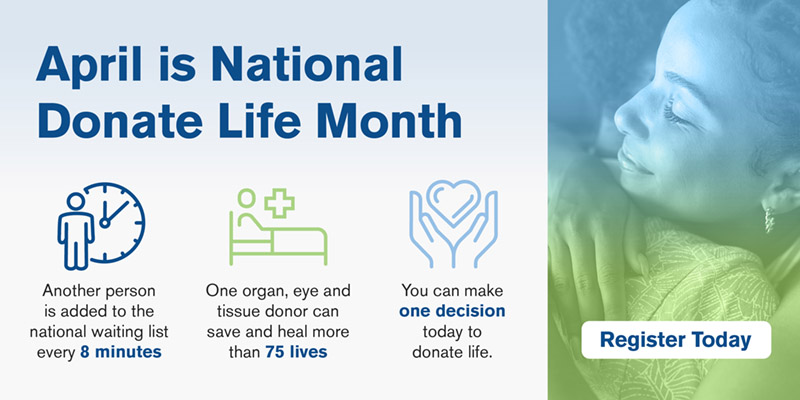Life-and-death decisions are made every day. But you can make one simple decision today to donate life by registering to be an organ, tissue or bone marrow donor.
More than 120,000 men, women and children need an organ transplant and one person is added to the organ transplant list every 10 minutes, according to the Organ Procurement and Transplantation Network (OPTN).
But those people on the list may not receive one in time: 8,000 people a year die waiting. This means 22 people every day die waiting for an organ transplant.
Why become an organ donor?
"There is no greater gift in life than the gift of life," said Loyola cardiothoracic surgeon and chairman of cardiothoracic surgery, Jeffrey Schwartz, MD.
One organ donor can save eight people, and one tissue donor can help more than 75 people.
"We take for granted the ability to breathe and walk across a room, shower or lie flat in bed," Dr. Schwartz said. "Organ donation transforms a recipient's quality of life."
Tens of thousands of patients undergo organ transplants every year for heart, lungs, liver, pancreas, kidneys and intestines. Thousands more receive donations of bone marrow, skin, heart valves, cornea and tissue.
"I have witnessed the transformation that occurs for donor families and for the organ and tissue recipients," said Loyola pulmonologist and medical director of lung transplantation Daniel Dilling, MD. "Registering to be an organ and tissue donor is a quick, simple process that ensures you are part of that transformation.”
How to become an organ donor
Registering as an organ, eye and tissue donor is simple: all you need is your driver’s license.
Loyola partners with Gift of Hope to host a donor registration drive in honor of National Donate Life Month. You can help us reach our goal by adding your name to the donor registry online.
In Illinois, you can sign up through the Secretary of State's office by visiting a facility where driver’s licenses are issued, on the website or by calling 800-210-2106.
Remember to tell your family you have registered so they may support your decision. There are other ways to donate life, such as by donating blood, blood platelets or bone marrow.
Living donors also can help patients who need a kidney or liver transplant. Such transplants use a portion of the healthy donor's liver that will regenerate and heal.
“There are so many people fighting for their lives,” said Kim Grosvenor, RN. “Without organ donation, those who are suffering will continue to suffer and may not be saved,” Grosvenor said.
Organ donation facts
- You can be a donor at any age.
- Celebrity or financial status are not factors in getting a transplant.
- Donation is possible with many medical conditions.
- All major religions approve of organ and tissue donation.
- A national computer system and strict standards are in place to ensure ethical and fair distribution of organs.
- A healthy person can become a living donor by donating a kidney, or a part of the liver, lung, intestine, blood or bone marrow.
- Learn more organ donation facts.
Source: UNOS (United Network for Organ Sharing)
Learn more about:
- Organ and tissue donation
- Blood and blood platelet donation
- Bone marrow donation
- Loyola's bone marrow and stem cell transplant program
- Living donors for liver and kidney transplantation
Transplant Care at Loyola Medicine
Loyola Medicine has one of Chicago’s most experienced transplant centers. In 1988, Loyola was the first medical center in Illinois to perform a successful lung transplant in and have since completed nearly 1,200 lung transplants. Loyola also established the area’s first heart transplant program in 1984.
As an academic medical center, you’ll find a wide range of services. Our highly trained teams provide all types of solid organ transplants, including lung, heart, liver, kidney and pancreas transplants.
In addition, we:
- Accept challenging cases, including patients turned down at other centers
- Offer advanced procedures such as dual heart-lung transplants
- Operate active living donor liver and kidney transplant programs
- Provide follow-up care at Loyola locations throughout Chicago’s western and southwestern suburbs
Loyola's expert and recognized transplant team has one goal: restoring you to better health. You can schedule an appointment today by calling our specific transplant center programs:
- Heart Transplant: 708-327-3700
- Lung Transplant: 708-327-3700
- Kidney, Liver and Pancreas Transplant: 708-327-3700
Jeffrey Schwartz, MD, is a thoracic and cardiothoracic surgeon at Loyola Medicine and is surgical director of lung transplant. His clinical interests include adult cardiac surgery, aortic aneurysms, aortic valve surgery, familiar aortic disease, familial thoracic aortic disease, heart surgery, heart transplant, lung transplant, Marfan's syndrome, mechanical cardiac assist devices, mitral valve repairs, thoracic aortic surgery, thoracoabdominal aneurysm repair, valve-sparing aortic roots replacement and vascular surgery.
Dr. Schwartz earned his medical degree at Emory University School of Medicine. He completed residencies at University of Illinois Medical Center in general surgery and at University of Southern California School of Medicine in cardiothoracic surgery.
Daniel Dilling, MD, is a pulmonologist at Loyola Medicine and is medical director of lung transplantation. His clinical interests include advanced lung disease, alpha-1 antitrypsin deficiency, cystic lung disease, eosinophilic granuloma of the lung, interstitial lung disease, langerhans cell histiocytosis pulmonary disease, lung disease, lung transplant, lymphangioleiomyomatosis (LAM), lymphangiomatosis, pulmonary alveolar proteinosis, pulmonary fibrosis, rare lung diseases and Sjögren's interstitial lung disease.
Dr. Dilling earned his medical degree at Loyola University Chicago Stritch School of Medicine. He completed his residency at Loyola University Medical Center in internal medicine and completed a fellowship at Loyola University Medical Center in pulmonary and critical care medicine.
Book an appointment today to see a Loyola Medicine provider by self-scheduling an in person or virtual appointment using myLoyola.




